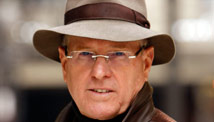Not just the tabloids: Media ethics sliding downhill
Not just the tabloids: Media ethics sliding downhill

STORY HIGHLIGHTS
- The News of the World tabloid scandal has outraged London, says James O'Shea
- Police say they have names of 4,000 potential victims of phone hacking, says O'Shea
- O'Shea: Murdoch's mudslinging tabloids have helped lower media standards everywhere
- Reporters who adhere to higher standards often are viewed as "old school" hacks, he says
Editor's note: James O'Shea is editor of the Chicago News Cooperative, a nonprofit news site dedicated to public service journalism in Chicago. He is a former managing editor of the Chicago Tribune and a past editor-in-chief of the Los Angeles Times. His latest book, "The Deal From Hell: How Moguls and Wall Street Plundered Great American Newspapers," was just published by Public Affairs.
Chicago -- If you're looking for one lesson from the phone-hacking scandal engulfing the media in London, try this: Reporters have simply traded their candlestick phones for a cell.
A candlestick phone? They were a staple of the 1920s-era newsroom in America, as one is reminded in the brilliant and current Chicago revival of "The Front Page," a hilarious 1920s and '30s Broadway and Hollywood hit about the unscrupulous, rough-and-tumble journalism in Chicago nearly a century ago.
The play, staged at a small neighborhood theater here, regales today's audiences with scenes of the "good old days" in American journalism when reporters fabricated evidence and lied to sources to get the proverbial "scoop."
But the tactics that produce howls of nostalgic laughter among Chicago audiences now are spawning a chorus of revulsion in London over charges that tabloid reporters chasing stories for Rupert Murdoch's News of the World hacked into cell phones of a murdered teenager, voice mails for survivors of the terrorist attacks on London, the voice mail of the royal family and even phone messages left for relatives of British servicemen killed in Afghanistan and Iraq.
On Friday, police arrested Andy Coulson, former editor of News of the World and a once-powerful aide to Prime Minister David Cameron.
On Thursday Murdoch's son James ordered the 168-year-old saucy tabloid closed. He also dismissed all of its roughly 200 employees regardless of whether they were involved in the hacking scandal at the News of the World, a weekly paper that sold more than 2.5 million copies every Sunday and was part of Murdoch's News Corp., a global media empire that also includes Fox News and the New York Post.
"The News of the World is in the business of holding others to account," Murdoch told the paper's employees, "but it failed when it came to itself." The outrage sweeping through London is understandable, both among the public and in the Murdoch family.
As the official investigation of the scandal heats up, police say they have identified the names of 4,000 potential victims of phone hacking over several years. They also are unearthing evidence that some of Murdoch's reporters or editors may have paid off policemen for information, all in hot pursuit of scoops.
For Murdoch, the scandal involves the king of crimes: Bad business. Public reaction to the newsroom hackers has cost News Corp. money. Advertisers eager to avoid the whiff of scandal at the tabloid have canceled ad campaigns with the paper. Moreover, "Hackergate" could jeopardize the company's bid to acquire the rest of British Sky Broadcasting, a pay-television company of which Murdoch already owns 39 percent.
Shutting the doors to the News of the World will doubtlessly cost Murdock a bundle, but remember that the paper's revenues represent a fraction of the income of News Corp.
Also, before everyone gets too frothy, let's put the whole affair in the context of our times and the sliding standards of the media world in which Murdoch operates -- one that his mudslinging tabloids have helped create.
Contemporary media ethics have been sliding downhill ever since the Internet gave voice to the likes of Matt Drudge, the blogger who reportedly got his start rooting through trash cans at CBS Studios in Hollywood looking for gossip in the 1990s.
Paying for information is nothing new. What's the difference between News of the World reporters paying police for information and a news organization paying for an interview, a practice once limited to supermarket tabloids but now increasingly accepted in one way or another at major television networks?
ABC, for example, recently paid Meagan Broussard, a woman who received lewd photos from former Rep. Anthony Weiner, $15,000 for her pictures before ABC interviewed her about the story. When major networks hire former Pentagon generals and politicians as commentators who often spout the Pentagon or party's company line, paying police for a good tip starts to sound like the inevitable next step.
The London scandal is simply a more egregious example of the declining standards increasingly common as many news organizations adopt the ethos of the entertainment industry and march down a road clogged with bloggers and Internet sites that publish first and check facts later -- if at all.
Reporters who adhere to higher standards in the dreaded "mainstream media" often are viewed in contemporary American newsrooms as "old school" hacks who "just don't get it."
And let's not get too worked up about Murdoch's closing a newspaper. The News of the World will publish its last edition on Sunday, but News Corp. also publishes The Sun, another splashy tabloid in London. Currently, it doesn't have a Sunday paper. As Hildy Johnson, a flashy reporter in Ben Hecht and Charles MacArthur's "Front Page" might have said: Stay tuned.
The opinions expressed in this commentary are solely those of James O'Shea.
http://edition.cnn.com/2011/OPINION/07/08/oshea.murdoch.standards/index.html?eref=mrss_igoogle_cnn